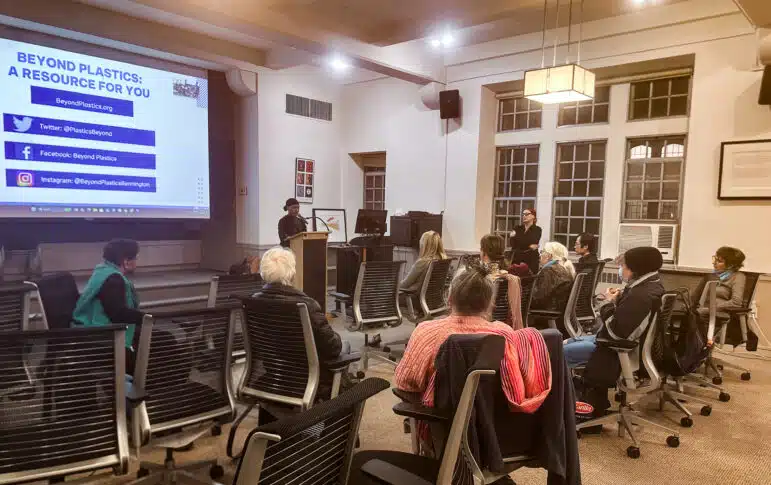
CEE and Beyond Plastics Host Workshop on Plastics Pollution and Community-Based Response
“Plastic is not just a waste and oceans issue, a climate change issue, an environmental justice issue—it’s also a public health issue. And the only way to stop plastic pollution is to stop plastic production. We need policy that holds industry accountable to accomplish that,” said Rev. Kathryn Beilke at a workshop co-hosted by the Center for Earth Ethics and Beyond Plastics at Union Theological Seminary on March 4.
The workshop, organized with the help of Union’s Eco-Justice Caucus and the Mainline Protestants Club, brought together students, activists, faith leaders and community members to examine the environmental and social impacts of plastics waste.
Rev. Beilke, development manager at Beyond Plastics, led a powerful discussion on the urgency of the plastics crisis. Beyond Plastics, an advocacy organization dedicated to ending plastic pollution, works to raise awareness and drive policy change. She outlined the historical rise of plastics, noting that since World War II, plastic waste has skyrocketed. “From 1950 to 2019, companies have produced 8.3 billion tons of plastic,” she said. Since then, we have seen an “onslaught of production and plastics incursion into literally every aspect of our lives.”
The only way to stop plastic pollution is to stop plastic production. We need policy that holds industry accountable to accomplish that
Rev. Kathryn Beilke
Starting with production, plastics pose severe environmental justice concerns. “The facilities which produce plastics are literally poisoning the people living near them,” Beilke explained. “People of color and those living below the poverty line are more likely to live within two miles of multiple plastic production facilities and are thus exposed to toxic chemicals with known and documented health risks.”
She also exposed the plastics industry’s “decades-long campaign of deceit” regarding recycling. “Plastic is not being recycled,” she stated. “Under 6% of plastics are being recycled in the United States, and only 9% of all the material ever produced globally has ever been effectively recycled.” Most so-called “recyclable” plastics end up in landfills or incinerators—or worse, shipped abroad or illegally dumped. Meanwhile, corporations push misleading narratives that place the burden on individuals rather than industry.
Rev. Beilke underscored the revolving door between the plastics and fossil fuel industries, and the climate impacts of plastics production. “Plastics are made from fossil fuels—oil, coal, and gas are the main feedstocks of plastic,” she said. “Over its life cycle—from extraction to production, use, transportation and disposal—plastics are responsible for greenhouse gas emissions equivalent to 116 coal-fired power plants.”
Our communities are places where we see the problem. And they’re also where we can act.
Taylar Enlow
She also sounded the alarm about micro and nanoplastics, which have been found everywhere from the highest mountain peaks to the human bloodstream. “We inhale them, we ingest them, we absorb them through our skin,” Beilke explained. “The chemical additives in plastic are known to cause cancer, speed puberty, and prompt infertility.”
A community discussion followed, with attendees brainstorming ways to combat plastic pollution locally. Ideas ranged from advocating for stronger recycling policies to launching faith-based initiatives for plastic-free congregations. “Our communities are places where we see the problem,” said CEE’s Taylar Enlow. “And they’re also where we can act.”
For more, see our policy note, “Plastics: From Innovation to Catastrophe.”
